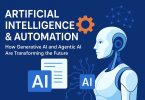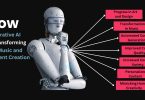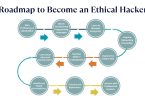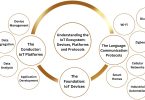Artificial Intelligence (AI) wields profound influence on society, sparking debates on its impact. From innovative AI-painted art to concerns about job displacement, the integration of AI in society raises questions on employment, societal shifts, and ethical implications. Exploring this dynamic relationship between AI and society unveils both its potential and contentious aspects.
Ethical Considerations and Future Challenges
The use of artificial intelligence (AI) technology within organizations will have an influence on how people perceive work, particularly their sense of meaningfulness in their activities.
Intelligent machine systems are constantly improving our daily lives, resulting in higher efficiency in a variety of areas.
Although prominent technology businesses urge further AI usage, ethical concerns and risk evaluations must be addressed before deployment.
Some of these problems are addressed further below.
Addressing Unemployment Challenges
A significant number of individuals dedicate a substantial portion of their active time to employment, aiming to provide for their own well-being as well as that of their loved ones. With its time-saving characteristics, AI advancement allows humans to devote more time to domestic duties, community participation, and discovering alternative ways to contribute to society.
Artificial Intelligence and society
AI deployment might decrease a company’s dependency on human labor, resulting in revenue concentration among individuals who control AI-driven firms. This tendency is already visible since company founders presently get a significant share of the economic surplus generated.
Hence, an important inquiry arises: How can we equitably distribute the wealth generated by automated systems?
Blurring the Line Between Human and Machine Conversations:
AI bots are becoming more capable of simulating human interactions and discussions. In the year 2015, a significant achievement was reached as Eugene Goostman, an artificial intelligence bot, became the inaugural computer program to successfully pass the Turing test. Human raters engage in text-based dialogues with an unknown entity in order to identify whether it is a human or a computer. An intriguing fact about Eugene Goostman performance in the Turing test is that over 50% of the evaluators who engaged with the bot were convinced they were conversing with a real person.
Safeguarding AI Systems
Learning produces intelligence. As a rule, systems undergo a training phase where they acquire the ability to identify patterns and provide suitable responses. Following that, the system enters a testing phase in which it is subjected to different situations in order to evaluate its performance.
AI systems can be tricked in ways that humans cannot. Consequently, if we depend on AI to substitute human labor, it is imperative to guarantee that it remains impervious to manipulation by individuals with hidden agendas.
The Dual Nature of AI
It is critical to recognize that AI systems are produced by imperfect people with flawed judgments and prejudices. While artificial intelligence has the ability to bring about great change, it also perpetuates inequality. AI has incredible speed and processing capability, far beyond human capabilities. However, it cannot always be depended on to stay unbiased and fair owing to human involvement.
Unintended Consequences
It is a probability that AI could unintentionally cause harm or negative consequences. Consider an AI system charged with eradicating cancer. It generates a formula after significant computation that meets this aim but results in the extinction of all living beings. Although the goal was met, it was not in accordance with human intentions.
AI is bad for society?
Human superiority is based on our brains and ingenuity, not only our physical might. We have traditionally defeated stronger, bigger, and quicker species by developing and deploying instruments to control them, both physically and cognitively.
This increases the possibility that AI will someday outperform humanity in this area. Machines that have been properly educated might possibly predict our behaviors and protect themselves against efforts to “pull the plug.”
The Legal Quandary
Machines’ capabilities are rapidly approximating those of humans, blurring the distinction between both. As we get closer to the point when robots are viewed as being capable of feeling, perceiving and behaving.
Here, concerns about their legal standing arise. Can “feeling” machines actually sense pain?
Navigating the Regulatory Landscape
Because of its strength and popularity, many feel that AI requires strict control. Determining who should make the rules is difficult. Companies currently developing and employing AI systems mainly self-regulate, relying on existing regulations and customer and shareholder responses.
While technological advancement can enhance people’s lives, it is critical to be aware of rising ethical issues about the relief of pain and the mitigation of potential bad repercussions.
We are approaching a turning point in the ever-changing AI ecosystem, where the use of AI technology is set to transform job experiences and societal dynamics. As we embrace the potential advantages of artificial intelligence in terms of higher efficiency and improved human lives, we must also address ethical problems such as wealth concentration, prejudices and the need for regulation.








Leave a Comment